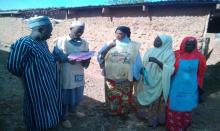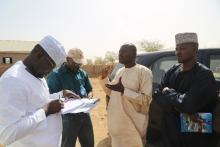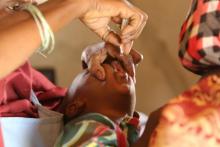Nigeria Concludes Synchronization of Vaccination Campaign with Neighbouring Niger, Cameroun and Benin.
Abuja, 30 March 2017- States sharing border settlements with neighbouring countries of Niger, Cameroun and Benin have completed scheduled synchronized vaccinations with different levels of successes recorded during the first National Immunization Plus Days (NIPDs) in 2017 aimed at stopping polio transmission in Nigeria and ensuring non- resurgence of the virus in polio-free countries.
In August 2016, the Nigeria government confirmed a polio outbreak with four children paralyzed in Borno state, northeastern Nigeria. Polio had not been detected anywhere on the African continent for close to two years before the outbreak.
Speaking on the collaboration to vaccinate children across international borders, Dr Fiona Braka, the WHO Nigeria Expanded Programme on Immunization (EPI) Team Leader explained, “Synchronization of immunization activities along all settlements leading to, or from a polio endemic country is a key strategy towards the prevention of polio transmission and importation. It rapidly boosts immunity among vulnerable populations and since all children are vaccinated around the same time, the likelihood of missing mobile populations is reduced”.
Historically, settlements lying along borders have been potential hideouts for wild polio virus (WPV) and could facilitate easy transmission.
Measures put in place to ensure optimal results
States in the North West of Nigeria comprising Jigawa, Katsina, Kebbi, Zamfara and Sokoto, sharing extensive international borders with the Republic of Niger, have administered oral polio vaccine to 47,467 children aged 0-59 months during the first round of the NIPDs from 25-29 March 2017 to boost the immunity of populations living in 84 border settlements.
Prior to the vaccination exercise, all routes, including highways, feeder roads, walkways, footpaths and other tracks linking Nigeria and the Republic of Niger were mapped during planning meetings to guarantee that vaccination teams are stationed at strategic points.
“During the four days of implementation, vaccination teams from both Niger Republic and Nigeria vaccinated eligible children transiting across the borders from both directions (in and out of Nigeria) with the assistance of border post officials”, Dr Suleiman Abdullahi, the WHO Northwest Zonal Coordinator mentioned.
An international assessment team from National Primary Healthcare Development Agency, WHO HQ and UNICEF HQ visited one such vaccination team in Sokoto state and expressed satisfaction with the best practices and innovations seen. They however suggested to the LGA team to recruit additional Port Health teams and make them permanent transit teams to provide weekly services due to the huge population traffic at border settlements.
Planning vaccination activities at border settlements
Equally, reports available from the North East show that eligible children have been vaccinated between Cameroun and Adamawa as well as in Cameroun and Taraba border settlements. Coordination with Cameroun in the northeast axis was completed with Adamawa and Taraba states early in March 2017 whereby joint planning meetings, attended by stakeholders from settlements on either side of both countries were conducted to identify routes/vaccination posts deploy trained human resources and allocate required funds. In the northeast region, currently facing humanitarian crisis with internally displaced persons spread across the six states, the campaign also offered the opportunity to deliver broader health interventions alongside polio vaccination to the most vulnerable populations.
Similar activities were conducted by Ogun, Oyo and Lagos states in the South West geo-political zone sharing common border settlements with Benin Republic. In the three states, plans were earlier finalized for vaccination teams to be posted to all the major exit and entry points while immigration, customs, and port health officials supported the teams to identify caregivers with eligible children for vaccination with OPV.
During the NIPDs in Lagos state with two wards in Badagary LGA bordering Republic of Benin, 3,102 children were vaccinated at international border settlements.
Feedback report to stakeholders
All respective WHO state offices will organize feedback meetings with stakeholders from Niger, Cameroun and Benin to discuss successes recorded, lessons learnt and ways to surmount the residual challenges faced during immunization campaigns.
In efforts to achieve interruption of polio virus transmission, WHO will continue to support the Nigerian government with innovations to ensure high vaccination campaign quality and certification standard disease surveillance are achieved as well as maintain particular focus on high risk areas.
For more information, please contact:
Technical contact:
Dr Fiona Braka; Tel: +234 703 170 5252; Email: %20%20%20%20brakaf [at] who.int ( brakaf[at]who[dot]int)
Media contact:
Ms Charity Warigon; Tel: +234 810 221 0093; Email: %20%20%20%20warigonc [at] who.int ( warigonc[at]who[dot]int)
Below:
01 - Polio vaccination at the Nigeria-Niger border crossing. Ilela, Sokoto. March 2017. Photo - WHO J Swan
02 - Nigeria-Niger International Border synchronization teams in Gada LGA Sokoto state. Photo - WHO Y Habibu
03 - International assessment team speaks with Port Health authority on measures taken to ensure vaccination for children crossing the Nigeria-Niger border. Ilela, Sokoto. March 2017. Photo - WHO J Swan






